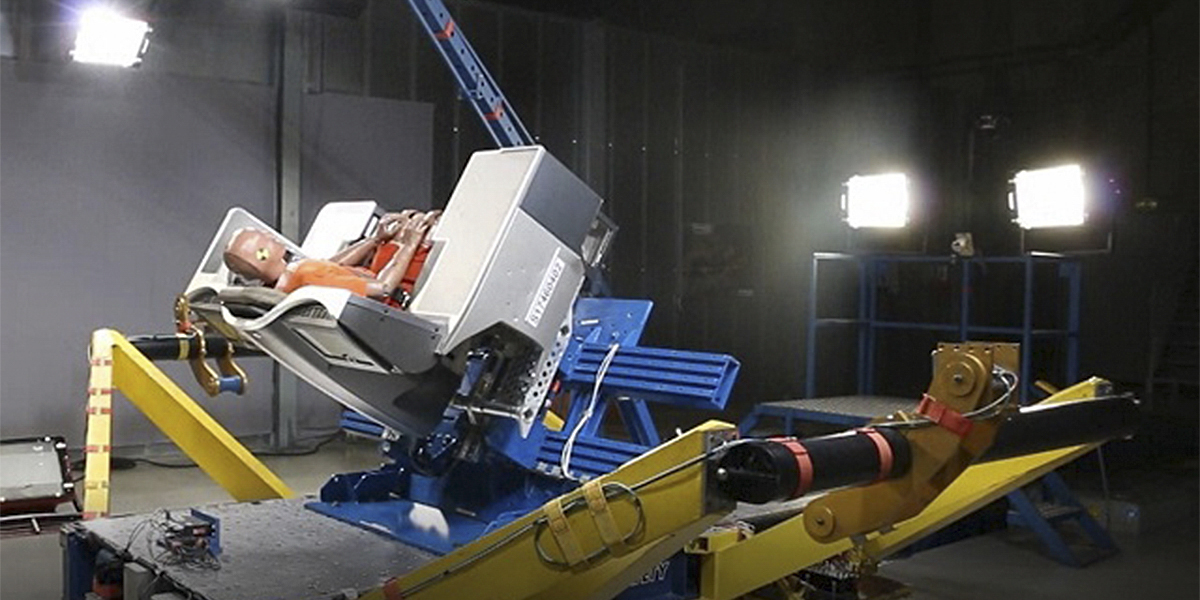SAE J1733 Anthropomorphic Dummy Data Calibration Test
The SAE J1733 standard specifies a procedure to calibrate anthropomorphic dummies used in automotive crash testing. This test ensures the accuracy and reliability of dummy data, which is critical for evaluating vehicle passive safety systems' performance. The calibration process involves subjecting the dummy to controlled impacts under specific conditions to validate its response parameters.
The SAE J1733 standard aims to ensure that all dummies used in crash testing adhere to a consistent set of criteria, thereby providing comparable and reliable data for vehicle safety assessments. This is particularly important as passive safety systems evolve with the introduction of new technologies like airbag sensors, pre-crash systems, and advanced restraint systems.
The test procedure involves several critical steps: - The dummy is positioned in a standardized position within a test vehicle. - Controlled impacts are applied to simulate real-world crash scenarios. - The dummy's response parameters (such as head acceleration, chest deformation) are measured and compared against the expected values defined by SAE J1733.
The calibration process is essential for ensuring that the data collected from dummy tests accurately reflects vehicle performance under various crash conditions. This ensures that manufacturers can rely on this data to make informed decisions about improving passive safety systems.
Failure to calibrate dummies according to SAE J1733 standards could lead to inaccurate test results, which may result in suboptimal design of passive safety systems or incorrect assessment of vehicle performance. This is particularly critical given the stringent regulatory requirements and consumer expectations surrounding vehicle safety.
Manufacturers and testing labs that adhere to SAE J1733 standards ensure their data is consistent with industry best practices, thereby enhancing trust in test results. This standardization also facilitates better communication between stakeholders involved in automotive safety research and development.
The SAE J1733 calibration process is not just about ensuring that dummies respond accurately to impacts; it's about creating a replicable and reliable testing environment. By doing so, manufacturers can ensure that their vehicles meet the latest safety standards without compromising on performance or reliability.
Eurolab Advantages
Eurolab offers unparalleled expertise in SAE J1733 calibration services. Our team of experienced engineers and technicians ensure that every aspect of the calibration process adheres strictly to industry standards. This commitment to precision and accuracy is reflected in our ability to provide reliable data that can be trusted by all stakeholders involved in automotive safety research.
Our state-of-the-art facilities are equipped with advanced instrumentation capable of capturing even the subtlest changes in dummy response parameters. This allows us to identify potential discrepancies early on, ensuring that any necessary adjustments are made promptly.
We pride ourselves on our ability to deliver quick turnaround times without compromising on quality. Whether you're a manufacturer looking to validate your latest passive safety system or an R&D engineer seeking accurate data for your research projects, Eurolab is here to meet your needs efficiently and effectively.
Our experienced team of professionals is dedicated to providing the highest level of customer service. We understand that time is of the essence in this industry, which is why we strive to minimize downtime while still delivering top-notch results. Our clients can rest assured knowing that they are receiving expertly calibrated dummies that will yield reliable and accurate test data.
At Eurolab, we also offer comprehensive training programs for those looking to learn more about the SAE J1733 standard or improve their calibration techniques. These sessions cover everything from basic principles to advanced applications, ensuring that our clients leave with a thorough understanding of how to best utilize this standard in their own work.
Quality and Reliability Assurance
At Eurolab, we take quality assurance very seriously. We have implemented robust processes and procedures designed specifically for SAE J1733 compliance, ensuring that every aspect of the calibration process meets or exceeds industry standards.
We employ rigorous quality control measures throughout the entire calibration process to ensure consistency and accuracy in our results. This includes regular audits by independent third parties who verify that all steps are being followed correctly.
Our state-of-the-art facilities are equipped with advanced instrumentation capable of capturing even the slightest variations in dummy response parameters, allowing us to identify potential issues early on. We use this information to make any necessary adjustments promptly and accurately.
We also conduct regular internal reviews and external assessments to ensure that our methods remain up-to-date with current best practices. This commitment to continuous improvement ensures that we are always providing the most accurate and reliable data possible.
Environmental and Sustainability Contributions
At Eurolab, we recognize our responsibility towards environmental stewardship and sustainability. Our SAE J1733 calibration services contribute to this effort by promoting the development of safer vehicles that are more environmentally friendly.
The accurate data provided through proper dummy calibration helps manufacturers design better passive safety systems that minimize injury risk while also reducing material waste and energy consumption during manufacturing processes. By improving vehicle crashworthiness, these systems help reduce fatalities and injuries in real-world collisions.
Additionally, the use of standardized dummies ensures consistency across different models and brands, which promotes fair competition within the industry. This uniformity allows for better comparison between vehicles, helping consumers make informed choices based on objective performance metrics rather than subjective factors.





